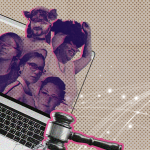16/Junio/2021. Joint civil society statement: “People’s health and rights – and not intellectual property and profit – should be at the centre of responses to the COVID-19 crisis”
As international, regional and national civil society organisations working at the intersection of technology and human rights, we are deeply concerned over the fact that access to vaccines and medications is being handled in accordance with a paradigm that puts intellectual property rights and profit over human rights and people’s health in the midst of the devastating COVID-19 pandemic. We are also troubled by the lack of analysis of the human rights implications that the use of digital technologies has on this matter.
On 12 May, a report from a panel of experts commissioned by the World Health Organization (WHO) declared that the COVID-19 pandemic was preventable. According to them, “weak links at every point in the chain of preparedness and response” led to disaster. However, among its key findings, the panel acknowledged the success observed in the development of vaccines at unprecedented speed.
For this to have happened, open data and open science collaboration were of central importance. One example of such collaboration offered by the panel was the sharing of the virus’ genome sequence on an open platform – which led to “the most rapid creation of diagnostic tests in history.”
The sharing of the genome is an example of the initial wave of collaboration and solidarity that sought to promote a cooperative global response to the crisis in early 2020. In March of that year, the COVID-19 Technology Access Pool (C-TAP) was launched by WHO, to “compile, in one place, pledges of commitment made under the Solidarity Call to Action to voluntarily share COVID-19 health technology related knowledge, intellectual property and data.”
These efforts were soon abandoned, however, to prioritise other initiatives, like COVAX, which instead of promoting collaborative coordination based on open models, reaffirmed intellectual property rights – even in the midst of a pandemic – and led to a distorted race that has cast a shadow over the distribution of vaccines. This distribution was not carried out in an equitable or strategic manner, imposing huge burdens on low- and middle-income countries and exacerbating global and national inequalities.
In early February 2021, WHO’s Director General alerted about this state of affairs:
“Globally, the number of vaccinations has now overtaken the number of reported infections. But more than three quarters of those vaccinations are in just 10 countries that account for almost 60% of global GDP. Around 130 countries, with 2.5 billion people, are yet to administer a single dose”.
In order to address this situation, the Independent Panel for Pandemic Preparedness and Response assembled by WHO recommended:
“the World Trade Organization (WTO) and WHO should convene major vaccine-producing countries and manufacturers to agree to voluntary licensing and technology transfer for COVID-19 vaccines. If actions do not occur within three months, a waiver of intellectual property rights under the Agreement on Trade-Related Aspects of Intellectual Property Rights should come into force immediately”.
It is important that efforts to overcome barriers to responding to COVID-19 include the intellectual property rights regime as a whole. Producing mRNA vaccines requires access to computational algorithms that can be protected by copyright. Repairing and reproducing ventilators and other medical devices require access to software subject to copyright. It also requires public interest exceptions to knowledge and educational works and make them available for remote and digital use, particularly during social distancing and lockdowns periods.
The challenge is twofold: act with global care and commitment to everyone’s right to health and to access to life-saving medicine in response to the current pandemic, and avoid mismanagement of global health should a new global health crisis emerge. In other words, if we are to properly handle the current pandemic and further waves of the current pandemic and avoid a new one, we need to put people’s health and rights – and not intellectual property and profit – at the center.
This is certainly not the only measure needed to avoid repetition, but it is an urgent and actionable one. Increasing the broadness and speed of vaccination could help address the current high rates of transmission of the virus and the emergence of variants. This measure could also have a positive impact on the response capacity, especially in low- and middle-income countries, related to strengthening of local vaccine production capacities, training of qualified human resources and access to knowledge, which will be useful not only for this pandemic but also for those that could come in the future.
We strongly support international solidarity in addressing all intellectual property barriers to the prevention, containment and treatment of COVID-19 and praise the decision of the United States government to back an intellectual property waiver on COVID-19 vaccines. It is critical that research and other resources are made available immediately everywhere in the world to use and build upon. Removing legal barriers to knowledge is a key complement to efforts to remove patents and other barriers needed for the massive, urgent scale-up of vaccine production. In addition, the decision of the US government, which should be emulated by other governments in the global North, sets the basis for provoking a turning point towards justice in relation to access to vaccines and towards putting people’s lives ahead of corporate profit.
Intellectual property barriers in the fight against COVID-19 have to be recognised and addressed. The World Trade Organization (WTO) can invoke a waiver of certain IP rights on relevant technologies that are affecting fundamental rights such as health and education due to the exceptional global crisis in which we are living.
This was the proposal put forward by India and South Africa in October 2020. These countries, later joined by others, requested that
“WTO members waive four categories of IP rights – copyright, industrial designs, patents and undisclosed information under the Agreement of Trade-Related Intellectual Property Rights (TRIPS) until the majority of the world population receives effective vaccines and develops immunity to COVID-19”.
On 5 May, the United States, one of the WTO members opposing the waiver proposal, announced a change in its position. While the US statement limits its support for waiving intellectual property rights to vaccines only, it may trigger another important round of negotiations at the WTO.
Stopping this tragedy requires solidarity and cooperation in promoting health as a human right and a sensible use of digital technologies to that end. In that sense, it is crucial that governments and the different stakeholders address the persistent digital exclusion and the intersections of the pandemic situation and the digital divide. Over-reliance on digital technology to monitor the pandemic and provide information and for vaccine administration management has added another layer of exclusion and discrimination of the most vulnerable sectors. As witnessed in India and other countries in the global South, this leads to more exclusion.
We, the undersigned organisations:
- Urge world leaders to recommit to the discussion about the need for a novel paradigm in the governance of global health science, data and patents. Monopolies in drug knowledge and markets are a threat to our current efforts to survive the COVID-19 pandemic and other global health crises to come. They also represent a severe threat of an unprecedented worsening of existing global social inequalities and other determinants of health due to the way in which world leaders and international institutions are handling the global health crisis.
- We call on states to support the TRIPS waiver, guaranteeing the adoption of measures, including the transfer of technologies, that ensure adequate implementation, to promote universal access to health care and free vaccination for all.
- We call on states to support the TRIPS waiver, guaranteeing the adoption of measures, including the transfer of technologies, that ensure adequate implementation, to promote universal access to health care and free vaccination for all.
We express our conviction in the power that governments have to provide a more human response to the pandemic and ensure that digital technologies contribute to more effective responses to it. Governments have in their hands the possibility to lift the intellectual property barriers that hinder universal access to health care and free Covid-19 vaccination for all.
If you or your organisation would like to sign on to this statement, click here.
Signatories
Association for Progressive Communications (Global)
Centro ISUR (Colombia)
Digital Empowerment Foundation (India)
Fundación IFARMA (Colombia)
Fundación Karisma (Colombia)
Hiperderecho (Peru)
Point of View (India)


